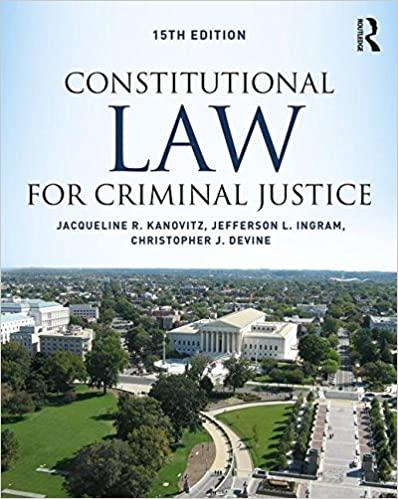Question
Part I: Stephen Muka owned U.S. Robotics. He hired his brother Chris to work in the company. His letter promised Chris $1 million worth of
Part I:
Stephen Muka owned U.S. Robotics. He hired his brother Chris to work in the company. His letter promised Chris $1 million worth of Robotics stock at the end of one year, "provided you work reasonably hard & smart at things in the next year." (We should all have such brothers.) Chris arrived at Robotics and worked the full year, but toward the end of the year Stephen died. His estate refused to give Chris the stock, claiming their agreement was a personal satisfaction contract and only Stephen could decide whether Chris had earned the reward. Comment.
- Explain the arguments that Chris can make
- Explain the arguments that the estate can make
- Evaluate the arguments and give your opinion on who should win.
Part II:
Ken Ward was an Illinois farmer who worked land owned by his father-in-law, Frank Ruda. To finance his operation, he frequently borrowed money from Watseka First National Bank, paying back the loans with farming profits. But Ward fell deeper and deeper into debt and Watseka became concerned. When Ward sought additional loans, Watseka insisted that Ruda become a guarantor on all of the outstanding debt, and the father-in-law agreed. The new loans had an acceleration clause, permitting the bank to demand payment of the entire debt if it believed itself "insecure," that is, at risk of a default. Unfortunately, just as Ward's debts reached more than $120,000, Illinois suffered a severe drought, and Ward's crops failed. Watseka asked Ruda to sell some of the land he owned to pay back part of the indebtedness. Ruda reluctantly agreed but never did so. Meanwhile, Ward decreased his payments to the bank because of the terrible crop. Watseka then "accelerated" the loan, demanding that Ruda pay off the entire debt. Ruda defended by claiming that Watseka's acceleration at such a difficult time was bad faith. Who should win?
- Evaluate the arguments.Who should win?Explain why.
.
Part III: Loehmann's
Loehmann's clothing stores, a nationwide chain with headquarters in New York, was the anchor tenant in the Lincoln View Plaza Shopping Center in Phoenix, Arizona, with a 20-year lease from the landlord, Foundation Development, beginning in 1978. Loehmann's was obligated to pay rent the first of every month and to pay common area charges four times a year. The lease stated that if Loehmann's failed to pay on time, Foundation could send a notice of default, and that if the store failed to pay all money due within 10 days, Foundation could evict. On February 23, 1987, Foundation sent to Loehmann's the common area charges for the quarter ending January 31, 1987. The balance due was $3,500. Loehmann's believed the bill was in error and sent an inquiry on March 18, 1987. On April 10, 1987, Foundation insisted on payment of the full amount within 10 days. Foundation sent the letter to the Loehmann's store in Phoenix. On April 13, 1987, the Loehmann's store received the bill and, since it was not responsible for payments, forwarded it to the New York office. Because the company had moved offices in New York, a Loehmann's officer did not see the bill until April 20. Loehmann's issued a check for the full amount on April 24 and mailed it the following day. On April 28 Foundation sued to evict; on April 29 the company received Loehmann's check. Please rule.
- What did Loehmann do or not do under the contract?
- Discuss how the concept of breach applies here
- Evaluate the arguments.Who should win?Explain why.
Step by Step Solution
There are 3 Steps involved in it
Step: 1

Get Instant Access to Expert-Tailored Solutions
See step-by-step solutions with expert insights and AI powered tools for academic success
Step: 2

Step: 3

Ace Your Homework with AI
Get the answers you need in no time with our AI-driven, step-by-step assistance
Get Started


